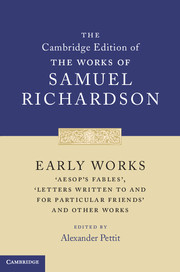Book contents
- Frontmatter
- Dedication
- Contents
- General Editors’ Preface
- Acknowledgements
- Chronology
- List of Abbreviations
- General Introduction
- Textual Introduction
- The Apprentice’s Vade Mecum (1733)
- A Seasonable Examination of the Pleas and Pretensions (1735)
- Preface to Aubin, A Collection of Entertaining Histories and Novels (1739)
- Aesop’s Fables (1739)
- Letters Written to and for Particular Friends (1741)
- Six Original Letters Upon Duelling (1765)
- Appendix: The Infidel Convicted (1731)
- Postscript
- Emendations
- Word-division
- Bibliographical Descriptions of Early Editions
- Explanatory Notes
- Index
Letter CLVIII
Published online by Cambridge University Press: 30 June 2022
- Frontmatter
- Dedication
- Contents
- General Editors’ Preface
- Acknowledgements
- Chronology
- List of Abbreviations
- General Introduction
- Textual Introduction
- The Apprentice’s Vade Mecum (1733)
- A Seasonable Examination of the Pleas and Pretensions (1735)
- Preface to Aubin, A Collection of Entertaining Histories and Novels (1739)
- Aesop’s Fables (1739)
- Letters Written to and for Particular Friends (1741)
- Six Original Letters Upon Duelling (1765)
- Appendix: The Infidel Convicted (1731)
- Postscript
- Emendations
- Word-division
- Bibliographical Descriptions of Early Editions
- Explanatory Notes
- Index
Summary
From the same.
On the Diversions of the Play-house.
Honoured Madam,
Now I have, by your Indulgence, tarry’d in Town till the Approach of Winter, you will expect that I should give you a little Account of the Diversions of the Stage. To begin then: My Cousin William and his two Sisters conducted me last Night to the Playhouse, and we took Places in the Pit.
You may believe I was agreeably surprised at the Magnificence of the Stage, and its elegant Ornaments; and I was mightily pleased to see such a prodigious Number of People seated with Ease, and conveniently placed to hear the natural Pitch of a common Voice. I did not expect to find the Musick so near the Audience; but believe that the most proper Situation to convey the Sound over the whole Theatre.
The Play I saw was a Comedy, in which the Parts acted by Women had several Speeches that I thought not quite consistent with the Modesty of the Sex. And the Freedom of their Voice and Gestures, tho’, perhaps, suitable enough to the Characters they represented, were not so pleasing to a Mind bent upon innocent Amusement, (if not wholly upon Instruction) as Speeches that put us not to the Expence of a Blush. What Hardship must it be to the Minds of these Women, to enter first upon this Employment? How must their Virtue (and sure no Woman is without Virtue at her Entrance into the World) be shock’d to offer themselves for the Entertainment of Six hundred Men, and to utter Words which convey Ideas too gross for a modest Ear, and such as would be difficult to hear in private Company without Confusion! How hard then must the Utterance of them be to a numerous and gay Assembly! And yet, I am assured, several Women who get their Bread upon the Stage, are strictly virtuous. If such there are, how great must be their Merit, when compared with that of the wicked ones of our Sex, who are liable to none of their certain and numerous Temptations? But yet, where it can be avoided, why should Women expose themselves to certain Dangers, if there is a Possibility of obtaining a tolerable Subsistence without it?
- Type
- Chapter
- Information
- Early Works'Aesop's Fables', 'Letters Written to and for Particular Friends' and Other Works, pp. 500 - 501Publisher: Cambridge University PressPrint publication year: 2011

